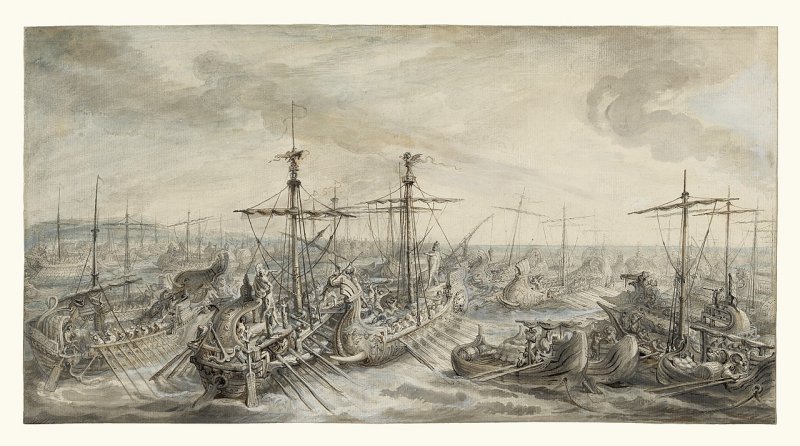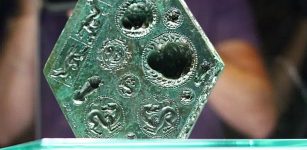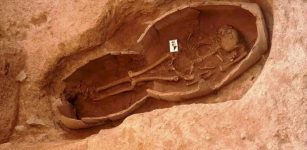Battle Of Cape Ecnomus: One Of The Greatest Naval Battles In History
Conny Waters - AncientPages.com - In 256 BC, during the First Punic War (264-241 B.C.) one of the greatest naval battles in history took place off the coast of Sicily, Italy.
As many as 330 ancient Roman ships confronted 350 Carthaginian ships. The struggle was long and many lives were lost. The fight between these two huge ancient powers is today known as the Battle Of Cape Ecnomus.
 The Naval Battle Near Ecnomus (256 BC) Description of The Roman Fleet Victorious over the Carthaginians at the Battle of Cape Ecnomus; This drawing is one of a series of illustrations Saint-Aubin made in the 1760s for an ambitious history of Rome. Engravings after drawings as well as maps were to accompany this multi-volume series which was never completed. In 1789, twenty-nine engraved plates from Saint-Aubin's drawings illustrated a more modest Roman history. Gabriel de Saint-Aubin - J. Paul Getty Museum - Public Domain
The Naval Battle Near Ecnomus (256 BC) Description of The Roman Fleet Victorious over the Carthaginians at the Battle of Cape Ecnomus; This drawing is one of a series of illustrations Saint-Aubin made in the 1760s for an ambitious history of Rome. Engravings after drawings as well as maps were to accompany this multi-volume series which was never completed. In 1789, twenty-nine engraved plates from Saint-Aubin's drawings illustrated a more modest Roman history. Gabriel de Saint-Aubin - J. Paul Getty Museum - Public Domain
Ancient Romans tried to control the Mediterranean Sea, but they had a great enemy that could not be easily defeated – the Carthaginians.
Carthage was without doubt one of Rome’s toughest adversaries in regard to control of the Mediterranean Sea.
In 256, the Romans sent a fleet of no less than 330 ships from Sicily to Africa, where the army aboard was supposed to strike at the Carthaginian homeland. Before crossing the Mediterranean, it encountered a Carthaginian navy of 350 ships, not far from modern Licata, at Ecnomus, an early third-century city founded by refugees from Gela, The site has been identified at Poggio di Sant' Angelo.
Both sides thought that they fought now on equal terms, and both threw themselves most thoroughly into the task of organizing naval forces and disputing the command of the sea.
Each of the ships had around 300 rowers and 120 combat troops, which adds up to a total of some 300,000 men. Even though they had fewer ships, the Romans won after a long struggle and only suffered around 10,000 casualties while the Carthaginians lost more than 40,000.
The war was not over yet, though. Carthage would stay a formidable archenemy of the Roman Empire for many years to come.
K. Tipps explained that “at least three major questions emerge from the modern controversy over Ecnomus. The first concerns the numbers, both of men and ships, engaged in the battle; the figures provided by Polybius have been manipulated in modern scholarship, and with generally negative effects on our understanding.
The second item in need of correction is the largely skeptical attitude adopted in modern times towards the battle formation of the Roman fleet as described by Polybius. Here again, it is the testimony of Polybius himself that is more persuasive than the arguments of his critics.
The third question concerning the battle is perhaps the most difficult: the action at Ecnomus gives the appearance of having been determined and guided by the Carthaginian commanders, but victory – by a decisive margin – went to Rome. By what means was the comparatively inexperienced Roman fleet able to defeat a Carthaginian force roughly equal and probably slightly superior in size, under conditions that were likewise largely equal and, if anything, favored the Carthaginians? This is the opposite of the result that we would naturally expect, and one that still cries out for explanation. “ 1
According to Tipps, “ the Roman victory at Ecnomus was most directly the result of a serious blunder – not on the part of the Carthaginians, but rather of the Romans themselves, who emerged as accidental victors when their illogical and unpredictable behavior in the opening phase of the action fatally disrupted the tactics prepared by the Punic admirals.“
Written by Conny Waters – AncientPages.com Staff Writer
Copyright © AncientPages.com All rights reserved. This material may not be published, broadcast, rewritten or redistributed in whole or part without the express written permission of AncientPages.com
Expand for references- Tipps, G. K. "The Battle of Ecnomus." Historia: Zeitschrift Für Alte Geschichte 34, no. 4 (1985): 432-65. http://www.jstor.org/stable/4435938.
- Walbank, F. W. "Polybius, Philinus, and the First Punic War." The Classical Quarterly 39, no. 1/2 (1945): 1-18. http://www.jstor.org/stable/637362.
More From Ancient Pages
-
 Unexplained Mystery Of The Glowing Woman Who Baffled Scientists
Featured Stories | Jun 6, 2022
Unexplained Mystery Of The Glowing Woman Who Baffled Scientists
Featured Stories | Jun 6, 2022 -
 Political Debates In Ancient Rome: Great Harshness, Personal Attacks And Unpleasant Atmosphere
Archaeology | Aug 29, 2018
Political Debates In Ancient Rome: Great Harshness, Personal Attacks And Unpleasant Atmosphere
Archaeology | Aug 29, 2018 -
 Atlit Yam – Fate Of The 9,000-Year-Old Underwater Megalithic Site With A Huge Stone Circle
Featured Stories | Jun 14, 2021
Atlit Yam – Fate Of The 9,000-Year-Old Underwater Megalithic Site With A Huge Stone Circle
Featured Stories | Jun 14, 2021 -
 Chaneques: Mischievous Legendary Tricksters In Mexican Folklore
Featured Stories | Apr 14, 2020
Chaneques: Mischievous Legendary Tricksters In Mexican Folklore
Featured Stories | Apr 14, 2020 -
 Ancient Roman Wine Was Spicy And Smelled Like Toast – Dolia Vessels Reveal
Archaeology | Jan 25, 2024
Ancient Roman Wine Was Spicy And Smelled Like Toast – Dolia Vessels Reveal
Archaeology | Jan 25, 2024 -
 Ancient Disc-Shaped Copper Ingots Found In Shipwreck At Bulgaria’s Sea Coast
Archaeology | Apr 28, 2020
Ancient Disc-Shaped Copper Ingots Found In Shipwreck At Bulgaria’s Sea Coast
Archaeology | Apr 28, 2020 -
 Four Magical Treasures Of Tuatha De Danann
Celtic Mythology | Jan 23, 2023
Four Magical Treasures Of Tuatha De Danann
Celtic Mythology | Jan 23, 2023 -
 Unique 2,000-Year-Old Hexagonal-Shaped Bronze Matrix Of Sarmizegetusa Regia, Romania
Artifacts | Jan 7, 2016
Unique 2,000-Year-Old Hexagonal-Shaped Bronze Matrix Of Sarmizegetusa Regia, Romania
Artifacts | Jan 7, 2016 -
 The Nunnehi – Immortal Spirit People And Mysterious Protectors Of The Cherokee Nation
Featured Stories | Mar 21, 2018
The Nunnehi – Immortal Spirit People And Mysterious Protectors Of The Cherokee Nation
Featured Stories | Mar 21, 2018 -
 Parthian Jar Burial Dated To 247 BC – 224 CE Unearthed In Iran’s Kurdistan Province
Archaeology | Sep 29, 2020
Parthian Jar Burial Dated To 247 BC – 224 CE Unearthed In Iran’s Kurdistan Province
Archaeology | Sep 29, 2020 -
 4,500-Year-Old Board Games And Game Pieces Unearthed At Gath
Archaeology | Jun 19, 2022
4,500-Year-Old Board Games And Game Pieces Unearthed At Gath
Archaeology | Jun 19, 2022 -
 Hedeby: Prestigious Trading Center And One Of The Largest Baltic Sea Ports In Viking Age
Featured Stories | Jun 18, 2016
Hedeby: Prestigious Trading Center And One Of The Largest Baltic Sea Ports In Viking Age
Featured Stories | Jun 18, 2016 -
 Reconstructing The Lost Ancient World Of The Marquesas Islands With Unique Plants And Animals
News | Mar 31, 2022
Reconstructing The Lost Ancient World Of The Marquesas Islands With Unique Plants And Animals
News | Mar 31, 2022 -
 Mystery Of Vitrified Scottish Fort Dun Deardail And Ancient Myth Deirdre Of The Sorrows: Is There A Prehistoric Connection?
Civilizations | Feb 5, 2021
Mystery Of Vitrified Scottish Fort Dun Deardail And Ancient Myth Deirdre Of The Sorrows: Is There A Prehistoric Connection?
Civilizations | Feb 5, 2021 -
 Överhogdal Tapestry: Amazingly Well-Preserved Ancient Textiles With Norse And Christian Motifs
Artifacts | Apr 26, 2019
Överhogdal Tapestry: Amazingly Well-Preserved Ancient Textiles With Norse And Christian Motifs
Artifacts | Apr 26, 2019 -
 Fire Reveals Notre-Dame De Paris Cathedral Was Historical First In Using Iron Reinforcements In The 12th Century
Archaeology | Mar 17, 2023
Fire Reveals Notre-Dame De Paris Cathedral Was Historical First In Using Iron Reinforcements In The 12th Century
Archaeology | Mar 17, 2023 -
 More Than 300 ‘Sun Stones’ Dated To Stone Age Discovered On Danish Island Of Bornholm
Archaeology | Dec 20, 2017
More Than 300 ‘Sun Stones’ Dated To Stone Age Discovered On Danish Island Of Bornholm
Archaeology | Dec 20, 2017 -
 New Species Of Softshell Turtle That Lived In North Dakota 66.5 Million Years Ago With Dinosaurs Discovered
Fossils | Mar 14, 2022
New Species Of Softshell Turtle That Lived In North Dakota 66.5 Million Years Ago With Dinosaurs Discovered
Fossils | Mar 14, 2022 -
 Lost Q Source Remains An Unsolved Biblical Mystery
Biblical Mysteries | May 7, 2017
Lost Q Source Remains An Unsolved Biblical Mystery
Biblical Mysteries | May 7, 2017 -
 Hypnos: God Of Sleep Who Owns Much Of Our Lives In Greek Mythology
Featured Stories | Mar 22, 2021
Hypnos: God Of Sleep Who Owns Much Of Our Lives In Greek Mythology
Featured Stories | Mar 22, 2021
